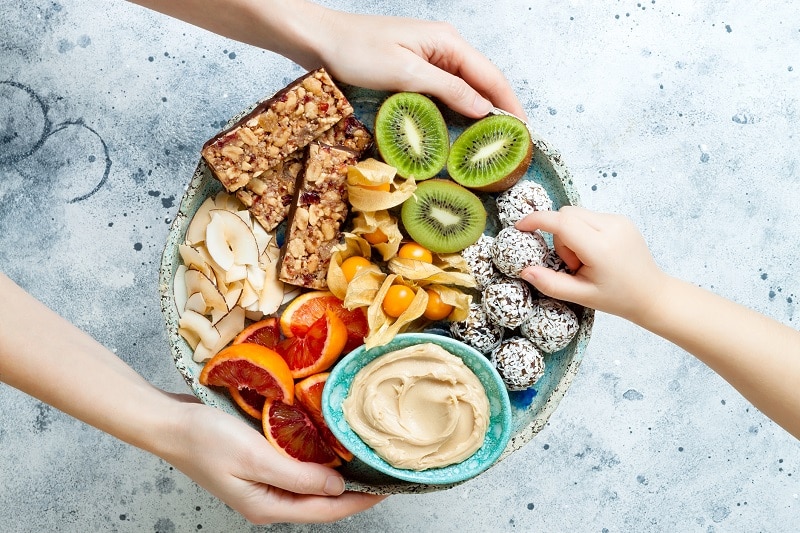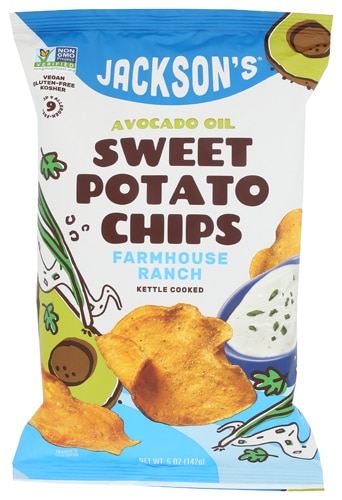[vc_row][vc_column][vc_column_text]There’s a lot involved when it comes to feeding kids. In addition to eating three meals a day, snacking is also a regular habit for most children. Since childhood is a crucial time to get proper nutrition and shape eating habits for later in life, it is important to help children develop healthy snacking habits as early as possible.
Here you’ll gain a better understanding of all things related to
healthy snacks for kids, including what they should eat and how often kids should snack, along with many other tips for parents and caregivers when planning and providing snacks.

Snacks for Kids: Benefits to Snacking, General Guidelines & Creative Ideas
What are the health benefits of snacks for kids?
Providing healthy snacks for kids plays an important role in supporting both their current and future health.
When healthy foods are offered, some of the
benefits of snacking can include:
- Providing them with energy to fuel their growing bodies and daily activities
- Can contribute essential nutrients to their diet to support proper growth and development
- Helping to control hunger, which can support a healthy weight
- May help manage cravings for desserts or other foods that are less nutritious
- Can help improve their ability to focus
- Can support balanced blood sugar levels
What should a healthy snack include?
Here are a few guidelines for caregivers when serving healthy snacks for kids:
- Focus on fiber. Fiber is a type of indigestible carbohydrate that comes from plants. Some of its many health benefits include supporting balanced blood sugar levels, managing weight, promoting healthy digestion and elimination and supporting heart health. Foods that are high in fiber include nuts, seeds, beans, whole grains, fruits and vegetables.
- Prioritize protein. Protein has been shown to help control hunger better than carbohydrates and fat. It is also a nutrient that supports nearly all of a child’s bodily processes, including hormones, immune system and bone development.
- Include produce whenever possible. Produce provides essential nutrients like fiber, antioxidants, vitamins and minerals. Children of school age need about 1 to 1 ½ cups of fruit and 1 ½ to 2 cups of vegetables every day. Yet most don’t get enough, particularly when it comes to vegetables. Offering it at snack time can help them meet their needs.
- Don’t forget about healthy fats. Fat is an essential nutrient for proper brain development in children. It also helps their bodies absorb some vitamins, and promotes a feeling of satisfaction when eating. Examples of healthy fats for kids include nuts, seeds, nut/seed butters, avocados and olive oil.
In addition to the nutritional qualities of a snack, caregivers should also prioritize making snacks appealing to children, affordable, practical and in line with the family’s culture and food preferences.
What should be limited or avoided when providing snacks?
It is a good idea for caregivers to limit snacks that are high in things like refined carbohydrates and added sugars, while being low in
filling nutrients like protein and fiber. These types of snacks may provide kids with energy, but they fail to provide the right nutrients a growing child needs. In addition, they are more likely to cause a crash in blood sugar not long after eating, which can trigger more hunger and potentially lead to overeating.
So, while desserts and other less nutritious foods can still have a place in a child’s diet, they should be served in proper proportion with other healthy foods.
How often do kids need to snack?
There is no exact answer to how often a child needs to snack. This is because every child is growing at a different rate, and has their own unique metabolism. In addition, kids have different activity levels, and their caloric needs can vary greatly. Yet because all children’s bodies are rapidly growing, eating more frequently throughout the day typically works best, especially since their stomach size is relatively small.
In general, many kids will need to be eating something about
every 3 to 4 hours. However, this time frame may need to be smaller for younger children or kids who are especially active. The
American Academy of Pediatrics recommends two to three small snacks daily for toddlers and two snacks daily for preschool?aged children, which may occur between meals and/or before bedtime.
How to help prevent snacking from getting out of hand
Allowing kids to graze or snack all day long may
lead to problems, such as interrupting their appetite for mealtimes and interfering with their ability to regulate their hunger and fullness levels. Implementing designated snack times and serving proper portion sizes for kids can help prevent snacks from getting out of hand. Snacks should be viewed as “mini meals” intended to provide just enough energy to sustain them until the next meal without becoming overly full.
Easy snacks to make for kids
While it may seem like there is a lot involved in putting together a healthy snack, it doesn’t have to be complicated. With practice, caregivers can create simple go-to snacks that can check all the right boxes, and that their children will love.
Here are a few examples of easy and healthy snacks for kids:
- Fruit with nut butter. This provides two important food groups and packs a lot of nutrition. To make things extra fun, caregivers can make “banana sushi” by spreading nut butter in between two banana slices or “apple nachos” by drizzling sliced apples with nut butter and a sprinkle of nuts.
- Veggie sticks dipped in guacamole or hummus. Pairing veggies with a fun and yummy dip can help even picky children be more inclined to eat them. To further support acceptance of this snack, caregivers can allow the child to pick out the type of vegetables they want, and even help arrange them in a fun bowl or plate for easy dipping. They can also experiment with different flavors of hummus, or add new ingredients to guacamole. If veggies still aren’t a hit, these nutritious dips can also be served with whole grain crackers, pita bread or baked pita chips.
- Yogurt parfait. Greek and Icelandic style yogurts provide satisfying protein along with the health benefits of natural probiotics. A yogurt parfait can be a colorful and nutritious snack for any time of day by layering plain yogurt with things like berries, low-sugar granola and chia seeds.
- Tuna with whole grain crackers. Canned tuna is a low-cost source of fish that is also a great source of anti-inflammatory omega-3 fats as well as lean protein. Serving it with whole grain crackers is a delicious and satisfying snack that is easy to make and serve. The tuna can be prepared however kids like best, and canned salmon can also be used as an alternative.
- Energy bites. These can be homemade or store bought. There is endless variety of what an energy bite might contain, but the healthiest versions are made with simple ingredients like oats, nut butter and dates, and contain minimal to no added sugar. You can make a big batch using a recipe, or buy them from a store to keep on hand as a yummy and nutritious on-the-go snack.
Snacking can offer many health benefits for kids. Healthy snack choices contain a variety of protein, fiber, healthy fats and produce, while being limited in added sugar and refined carbohydrates. Offering healthy snack choices at predictable times throughout the day can help children regulate their appetites while also providing essential nutrients and fuel to their growing bodies.[/vc_column_text][/vc_column][/vc_row][vc_row][vc_column][vc_text_separator title="Featured Products" border_width="2"][vc_row_inner equal_height="yes" content_placement="middle" gap="35"][vc_column_inner width="1/3"][vc_single_image image="167940" img_size="full" alignment="center" onclick="custom_link" img_link_target="_blank" css=".vc_custom_1690144665481{padding-right: 7% !important;padding-left: 7% !important;}" link="https://www.vitacost.com/gogo-squeez-happy-tummiez-organic-raspberry-pear-yellow-carrot-pouches"][/vc_column_inner][vc_column_inner width="1/3"][vc_single_image image="167941" img_size="full" alignment="center" onclick="custom_link" img_link_target="_blank" css=".vc_custom_1690144680589{padding-right: 7% !important;padding-left: 7% !important;}" link="https://www.vitacost.com/marys-gone-crackers-marys-gone-cheezee-organic-plant-based-crackers"][/vc_column_inner][vc_column_inner width="1/3"][vc_single_image image="167942" img_size="full" alignment="center" onclick="custom_link" img_link_target="_blank" css=".vc_custom_1690144694649{padding-right: 7% !important;padding-left: 7% !important;}" link="https://www.vitacost.com/navitas-organics-power-snacks-peanut-butter-jelly"][/vc_column_inner][/vc_row_inner][/vc_column][/vc_row]




